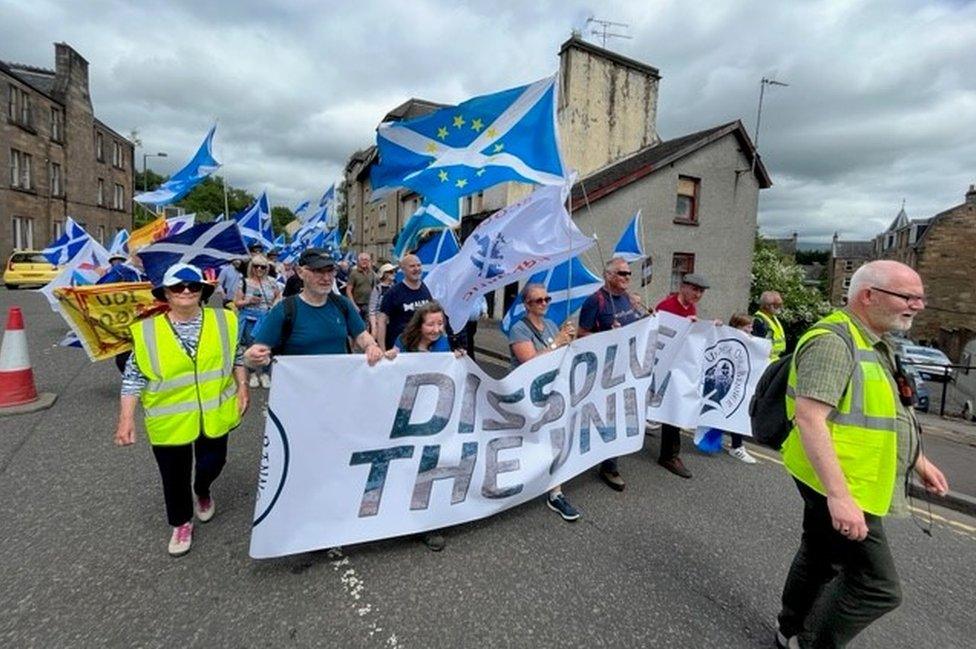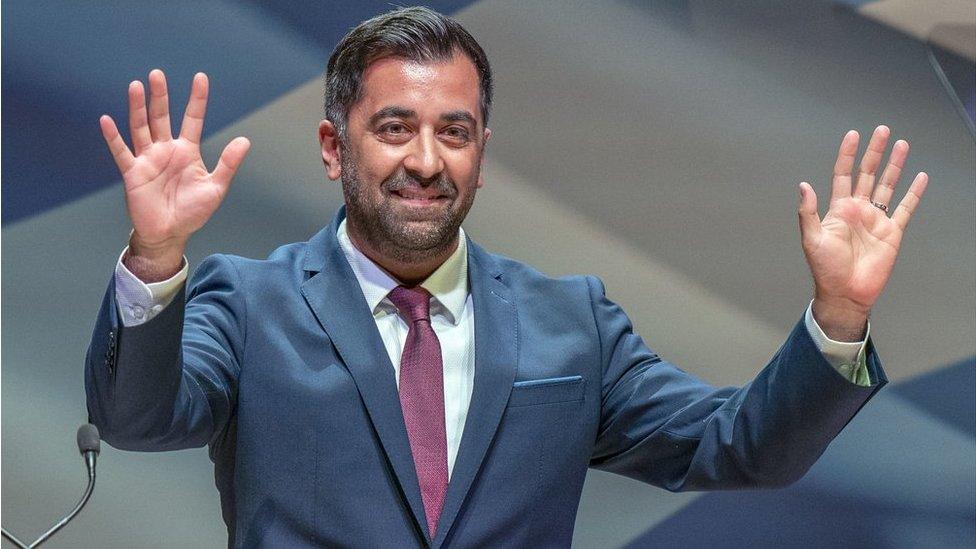SNP want indyref2 soon after UK election - Humza Yousaf
- Published
The first minister said Scotland is "suffering" from not being independent.
The SNP want to hold an independence referendum soon after the next general election, Humza Yousaf has said.
The first minister intends to open negotiations with Westminster if the SNP win the most seats in Scotland.
He previously told a party convention the only route to independence was through "lawful and democratic process".
Opposition parties criticised the plan and said the SNP should be focused on issues such as the cost of living.
On Saturday Mr Yousaf announced the party would initiate talks with the UK government after the next general election, which must be held by January 2025.
Asked on BBC Scotland's The Sunday Show when he would then plan to hold a referendum, the SNP leader said: "As soon as we possibly can. Absolutely.
"Of course we will negotiate that, no doubt, as part of the discussions with the UK government, but I have no time to waste.
"Scotland, I'm afraid, is suffering because we are not independent."
The first minister also said elements of his strategy were different from what the party had proposed in the past.
This includes stating in the opening line of its manifesto: "A vote for SNP is a vote for Scotland to become an independent country".
Mr Yousaf said his plan would also see the party "lay the foundations" for a newly independent state.
He added this would involve drafting a legal text on a withdrawal agreement and an interim constitution, as well as the appointment of a special envoy to Brussels in a bid to re-join the European Union.
Mr Yousaf told the programme: "It is the Westminster parties that continue to deny Scotland its democratic choice and the question that we must put to them is that if this is a voluntary union they have to prove it."


The SNP leader hasn't come up with a startling new proposal, a Yousaf Doctrine, to deliver independence.
And nor has he camped himself fully behind one of the existing options - instead he has voiced support for pretty much all of them.
Mr Yousaf is simultaneously up for gradually building support, for holding a referendum tomorrow, and for using an election result as a mandate for independence negotiations.
That serves two purposes for the first minister.
One is to bring his party together, months after he narrowly won the leadership - he can turn to any given faction and say he backs their preferred plan.
And the other is to offer flexibility - in a fast-moving political environment, he now has a selection-box of options to meet various circumstances.
Could any of this actually deliver independence? Because these plans aren't very new, they face a range of familiar questions on that front.
The real plan will be to get through the next election campaign, and see how the result changes the political context. Things may look very different once votes have actually been cast.

The first minister said an election win would mean securing the most seats in Scotland - even if the party ended up with fewer than the 45 it currently holds.
He also said the core of his speech to activists at the Caird Hall in Dundee was that the party had to grow popular support for independence.
Mr Yousaf added: "It is the power of the people that will break Westminster's intransigence."
The SNP leader told the convention a summer campaign would focus on the "opportunities of independence" and announced a major march and rally would be held in Edinburgh on 2 September.

The convention was held at the same time as an independence rally in Stirling
Despite the widespread assumption that Brexit and Boris Johnson would be gifts for the independence movement, Nicola Sturgeon did not manage to consistently push support for leaving the UK above 50%.
The UK government repeatedly refused to give her permission to hold a referendum despite the SNP's electoral successes during Ms Sturgeon's eight years as first minister and party leader.
The Yes movement was dealt a further blow last November when the Supreme Court ruled that the Scottish government did not have the powers to hold a vote without that permission being in place.
Ms Sturgeon's response to the court ruling was to propose treating next year's general election as a "de facto referendum"
Polling expert Prof Sir John Curtice said independence support is running at an average of 48% in recent polls - higher than support for the SNP itself.
A Panelbase poll for the Sunday Times, external last weekend put the SNP at 34% for the next general election and suggested that the party could be on course to win fewer seats than Scottish Labour, a prospect that would have seemed almost unthinkable a year ago.
The past few months have seen both Ms Sturgeon and her husband Peter Murrell being arrested and their home searched as part of an ongoing police probe into the SNP's funding and finances.
Both were later released without charge while further inquiries were carried out.

Humza Yousaf was applauded by delegates after his speech at the SNP independence convention in Dundee in Saturday
There has also been controversy over the Scottish government's handling of issues ranging from ferries and NHS waiting lists to gender reform and the deposit return scheme.
Scottish Conservative deputy leader Meghan Gallacher said Mr Yousaf had taken his predecessor's strategy and "put it on steroids".
She added: "After playing to the nationalist gallery on Saturday, the wider public will have seen through these interviews that he is hellbent on turning the next general election into a polarising vote on breaking up the United Kingdom.
"At a time when people across Scotland are struggling with the cost of living crisis and want the SNP-Green government to focus on their real priorities, Humza Yousaf is typically obsessed with holding another divisive referendum as soon as possible."
And Scottish Labour deputy leader Jackie Baillie said: "Humza Yousaf has made it clear - if your priority isn't a divisive and disruptive referendum, the SNP doesn't want your vote.
"This is a single-issue party without a coherent plan on how to deliver on their one policy of independence.
"The SNP has turned its back on anyone more concerned with ending the cost of living crisis, reviving our economy and rebuilding our public services."